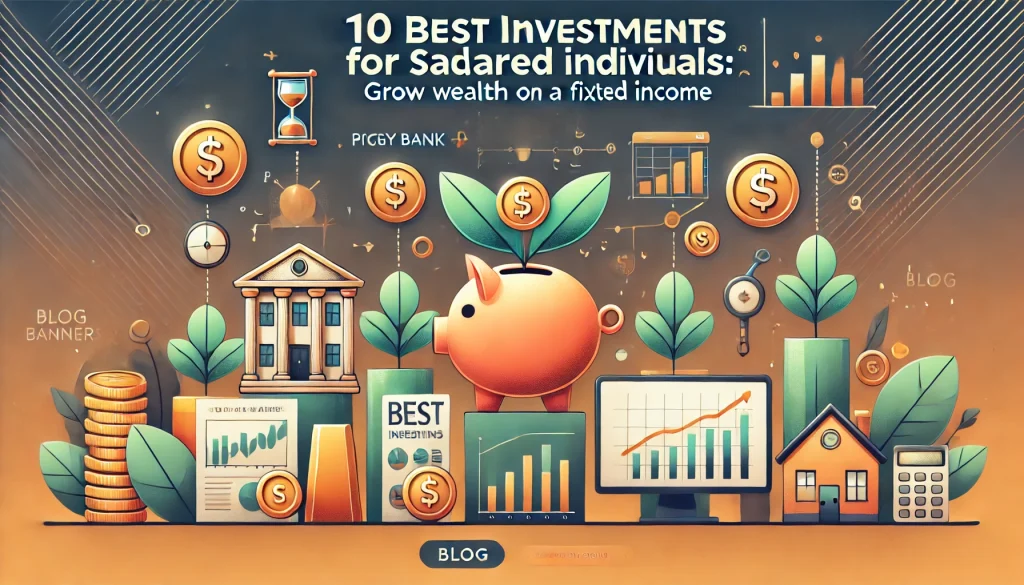
For working individuals, planning and managing finances help build wealth and a secure future. With a regular salary, you must make investments wisely. This will protect you against inflation, help you plan your retirement and allow you to achieve your financial goals.
With multiple options available, it can be challenging to select the one that will meet all your objectives. In this blog, we will discuss the 10 best investments for salaried individuals, which will help you make appropriate decisions.
Top 10 Investments for Salaried Individuals
There are a wide variety of investment options. It is important to analyse each of them before investing. Let us explore some of the best investment options for salaried employees:
1. Public Provident Fund (PPF)
Tenure: The Public Provident Fund is a long-term investment. PPF has a 15-year lock-in period.
Returns: PPF provides a 7.1% p.a. of guaranteed return. This is set by the government on a quarterly basis.
Tax Benefits: Salaried individuals are eligible to claim tax deductions up to ₹1.5 lakh on their PPF contributions u/s 80C of the Income Tax Act. The maturity proceeds and the amount of earned interest are also exempted from tax.
2. National Savings Certificate (NSC)
Tenure: The lock-in period of NSC is 5 years. It is a good option for individuals with long-term financial goals or who want to make savings for their retirement.
Returns: NSCs provide 7.7% p.a., of guaranteed return, set by the government on a quarterly basis.
Tax Benefits: Salaried individuals are eligible to claim deductions up to ₹1.5 lakh on NSC investments u/s 80C of the Income Tax Act.
3. Fixed Deposit (FD)
Tenure: There are different tenure ranges of FDs, like short-term, medium and long-term. Usually, the tenure ranges between 7 days and 10 years.
Returns: Fixed deposits offer guaranteed returns at a rate, ranging from 3% to 9%. Financial institutions or banks where the money is deposited will set these interest rates.
Tax Benefits: Salaried individuals are eligible for investment in tax-saver fixed deposits. This allows them to save tax payments u/s 80C of the Income Tax Act.
4. Monthly Income Scheme (MIS)
Tenure: The Monthly Income Scheme (MIS) has a tenure of 5 years. However, you can extend it for an additional 5 years if you pay a nominal fee.
Returns: It offers a fixed interest at the rate of 7.4% per annum.
Tax Benefits: The Monthly Income Scheme is a tax-saving option as well. You can claim up to ₹1.5 lakh deduction u/s 80C of the Income Tax Act.
5. National Pension Scheme (NPS)
Tenure: The lock-in period of NPS is till the investor turns 60. Although premature withdrawal is possible, it comes with various restrictions.
Returns: NPS provides market-linked returns. This implies salaried individuals can earn higher returns in the long term.
Tax Benefits: You can claim tax deductions up to 10% of salary (basic + dearness allowance) u/s 80 CCD(1) within ₹1.5 lakhs for NPS contributions. In addition to this, tax deduction till ₹50,000 u/s 80 CCD(1B) above the ₹1.50 lakh ceiling is available. Employees are also eligible for tax deductions till 10% of salary (basic + dearness allowance), 14% in case of contribution by the Central government, that an employer contributes u/s 80 CCD (2) above the ₹1.5 lakh limit.
6. Government Bonds
Tenure: The tenure of government bonds ranges between 5 to 40 years. However, premature withdrawal or renewal is possible with applied terms and conditions.
Returns: It comes with a variable interest rate.
Tax Benefits: Government bonds in India are currently taxable, but older tax-free bonds are available for purchase on stock exchanges.
7. Senior Citizens Savings Scheme (SCSS)
Tenure: The maturity period of the scheme is 5 years, which can be extended for 3 additional years. Interest payment can be done quarterly and you are eligible to reinvest or withdraw.
Returns: Senior Citizens Savings Scheme offers a fixed interest at the rate of 8.2% for the quarter that ends on 31st March 2024.
Tax Benefits: Individuals can claim tax deductions of up to ₹1.5 lakh on investments under Section 80C of the Income Tax Act, 1961. If the total interest exceeds ₹50,000 per year, TDS will be applied.
8. Endowment Plans
Tenure: The tenure of endowment plans can be 15 years, 20 years, 25 years or 30 years and be even longer.
Returns: Endowment plans provide a guaranteed sum assured either on the death of the policyholder or on maturity.
Tax Benefits: You can get tax benefits on the receipt of maturity amounts under endowment plans or on the payment of premiums.
9. Kisan Vikas Patra
Tenure: As of now, the tenure for this scheme is 115 months (9 years and 5 months).
Returns: The interest rate is 7.5% per annum. This is compounded yearly for the quarter which ends on 31st March, 2024.
Tax Benefits: Investment in KVP does not qualify for a deduction under Section 80C and the interest earned is fully taxable. A TDS of 10% is deducted annually on the credited interest.
10. Short-Term Debt Funds
Tenure: The maturity period of short-term debt funds is 3 years.
Returns: Short-term debt funds offer moderate returns as compared to equity funds.
Tax Benefits: For debt mutual funds purchased after April 1, 2023, all gains, regardless of the holding period, will be treated as short-term capital gains and taxed at the applicable slab rate, without any indexation benefit.
The Bottom Line
Selecting the right investments for salaried individuals can help build a comfortable lifestyle in the long run. It is important to be specific about your financial goals and risk tolerance level. If you require a tax deduction, select a tax-saving investment. You can make an investment in equity or ULIP if you expect income.
Frequently Asked Questions (FAQs)
Q. What is the NPS pension rule?
A. Upon retirement, an individual can withdraw up to 60% of their total retirement corpus as a lump sum. The remaining 40% must be allocated to an annuity plan.
Q. What is the minimum age for endowment plans?
A. The minimum age for most endowment plans is 18 years. However, the maximum age limit can vary.
Q. Is KVP tax-free on maturity?
A. Tax is applicable on the returns as KVP does not come under 80C deductions. However, withdrawals after the scheme’s maturity will be exempt from TDS.


